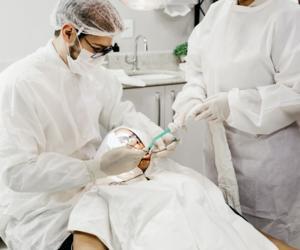“Is dry socket a type of infection?”
If I suspect dry socket, do I need a prescription for antibiotics? Is a dry socket a type of infection?
5 Answers
DentistDrySocket
Dry socket is not an infection; it's a side effect and symptom from after extractions are completed. They are common in patients that smoke after an extraction or patients that have issues with forming blood clots in the area. See a dentist if you suspect a dry socket for a therapeutic remedy.
Dry socket is not an infection and does not require antibiotics. Instead, it is disruption of clotting/healing, which is quite uncomfortable but should resolve with time. Some patients opt to return to their provider to have a soothing medication placed at the site of extraction. Although this procedure will delay the healing process, it will decrease pain.
A dry socket we believe is caused by a blood clot not forming the exposed bone causes a dull aching pain without this blood clot it is very uncomfortable. My belief is that a dry socket is caused by certain types of bacteria and maybe fungus two that are remaining in an infected site typically this is very common in wisdom teeth surgical extractions. I find using O-Zone in my practice has lessened this markedly
Best Regards,
Dr. Mark Berkowitz
Best Regards,
Dr. Mark Berkowitz
This is a question best answered by your dentist who took out the tooth or an oral surgeon.
Good luck.
Good luck.
By definition, a dry socket is when you have a tooth extracted, and a membrane does not completely form over the hole (socket) where the tooth came out of, the bone is exposed to air and dries out. Strictly speaking, it is not an infection because theoretically there is no bacteria involved, but you should definitely contact and make an appointment with the doctor who extracted your tooth to have it looked at to determine the best course of action.








